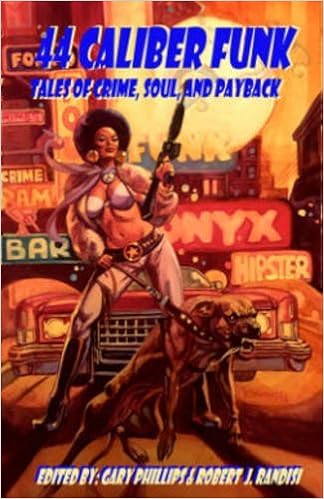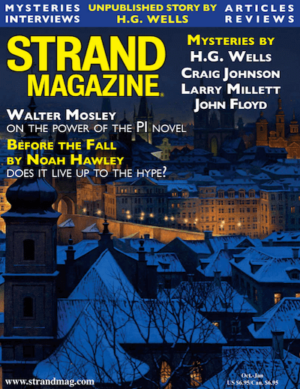Wednesday, January 18, 2017
Little Big News: The Best stories of 2016, says me.
Over at SleuthSayers I list the 13 best mystery stories of the year, culled from this page, of course. Two are from the book at right.
Sunday, January 15, 2017
Motive, Opportunity, Means, by Mark Bastable
"Motive, Opportunity, Means," by Mark Bastable, in The Thrill List, edited by Catherine Lea, Brakelight Press, 2016.
Congressman John Fuller left his wife for his secretary. Said wife did not take it well. Now she has plotted an elaborate revenge, and Fuller's future depends on the shrewdness and determination of an overworked cop named Pinski who just wants to spend some time with own wife.
If this description sounds a little sparse, you are right. I don't want to give away any of the secrets of this marvelous, convoluted plot.
Congressman John Fuller left his wife for his secretary. Said wife did not take it well. Now she has plotted an elaborate revenge, and Fuller's future depends on the shrewdness and determination of an overworked cop named Pinski who just wants to spend some time with own wife.
If this description sounds a little sparse, you are right. I don't want to give away any of the secrets of this marvelous, convoluted plot.
Sunday, January 8, 2017
The Formula, by Jerry Kennealy
"The Formula, by Jerry Kennealy, in 44 Caliber Funk, edited by Gary Phillips and Robert J. Randisi, Moonstone Press, 2016.
There are some good stories in this book but I have to say: the manuscript should have danced the Hustle one more time with a copy editor. Spellchecker doesn't catch missing words or spot when characters names suddenly change.
Moving on to Kennealy's story: It's 1970. Private eye Johnny O'Rorke has been hired to find an actress. Susan Jeffers vanished with a few scenes left to film in a Western which is already snake-bit, seeing how the first star killed himself.
The movie producer is philosophical, which is not the same as being resigned:
"It used to be so simple. We had a formula: boy meets girl, boy loses girl, boy gets girl back."
He brought his hands together ina loud snap. "Now its boy screws girl, girl gets gangbanged by thugs, boy kills thugs, girl decides to become a lesbian."
Which is not exactly what has happened to the actress. But her fate is a long way from formulaic.
There are some good stories in this book but I have to say: the manuscript should have danced the Hustle one more time with a copy editor. Spellchecker doesn't catch missing words or spot when characters names suddenly change.
Moving on to Kennealy's story: It's 1970. Private eye Johnny O'Rorke has been hired to find an actress. Susan Jeffers vanished with a few scenes left to film in a Western which is already snake-bit, seeing how the first star killed himself.
The movie producer is philosophical, which is not the same as being resigned:
"It used to be so simple. We had a formula: boy meets girl, boy loses girl, boy gets girl back."
He brought his hands together ina loud snap. "Now its boy screws girl, girl gets gangbanged by thugs, boy kills thugs, girl decides to become a lesbian."
Which is not exactly what has happened to the actress. But her fate is a long way from formulaic.
Sunday, January 1, 2017
The Projectionist, by Joe R. Lansdale
"The Projectionist," by Joe R. Lansdale, in In Sunlight or in Shadow, edited by Lawrence Block, Pegasus Books, 2016.
A warning: this is not a collection of crime stories, per se. The connecting thread is that they are all inspired by paintings of Edward Hopper. No doubt that this story is about crime, though.
The narrator is a projectionist at a movie theatre. He's naive and not that bright - one character calls him a "retard" but that's not fair. The job is okay, and then Sally arrives. Sally is an usherette, and beautiful.
Sounds like we are building up to a classic noir plot, but that's not quite the way it happens. Instead the theatre gets a visit from The Community Protection Board, a bunch of shakedown artists who threaten the theatre and Sally.
But they underestimate our hero. He's seen some bad times and knows some bad people. And soon the Protection Board may need protection...
I must say that of all the stories this one felt most to me like a Hopper painting.
A warning: this is not a collection of crime stories, per se. The connecting thread is that they are all inspired by paintings of Edward Hopper. No doubt that this story is about crime, though.
The narrator is a projectionist at a movie theatre. He's naive and not that bright - one character calls him a "retard" but that's not fair. The job is okay, and then Sally arrives. Sally is an usherette, and beautiful.
Sounds like we are building up to a classic noir plot, but that's not quite the way it happens. Instead the theatre gets a visit from The Community Protection Board, a bunch of shakedown artists who threaten the theatre and Sally.
But they underestimate our hero. He's seen some bad times and knows some bad people. And soon the Protection Board may need protection...
I must say that of all the stories this one felt most to me like a Hopper painting.
Sunday, December 25, 2016
The Wait, by Flávio Carneiro
"The Wait," by Flávio Carneiro, in Rio Noir, edited by Tony Bellotto, Akashic Books, 2016.
Bear with me. This may get a little philosophical at the start. We will get to the story.
I would like to suggest that some fiction really is genre fiction and some uses genre fiction. Wears it like a cloak to cover what is really going on. And that isn't necessarily a bad thing.
Jorge Luis Borges' brilliant story "The Garden of Forking Paths" is about a spy doing spy things. But is it a spy story? Not exactly. Is George Orwell's Animal Farm a fable or a political satire that uses the fable form?
Okay. Getting to this week's favorite. A beautiful woman walks into the office of a private eye. Sound familiar?
Detective Andre has an office in downtown Rio. Marina wants him to find a man. Again, still familiar.
But now the ground shifts under us a bit. All she knows about the man is that he has been following her every day for weeks. Now he has stopped and she wants him to start again.
Andre and his sidekick, Fats - or is Fats the brains of the operation? - set out to find the guy. Much philosphizing occurs. Roland Barthes is invoked.
The place where what we might call experimental fiction - those cloaked-in-genre things - tend to fall apart is the ending. Some of these authors seem to take pride in not writing the last page, leaving you wondering what happened and why you bothered to read the damned thing.
Carniero is not guilty of that. I found his ending quite satisfactory, as was the whole story.
Bear with me. This may get a little philosophical at the start. We will get to the story.
I would like to suggest that some fiction really is genre fiction and some uses genre fiction. Wears it like a cloak to cover what is really going on. And that isn't necessarily a bad thing.
Jorge Luis Borges' brilliant story "The Garden of Forking Paths" is about a spy doing spy things. But is it a spy story? Not exactly. Is George Orwell's Animal Farm a fable or a political satire that uses the fable form?
Okay. Getting to this week's favorite. A beautiful woman walks into the office of a private eye. Sound familiar?
Detective Andre has an office in downtown Rio. Marina wants him to find a man. Again, still familiar.
But now the ground shifts under us a bit. All she knows about the man is that he has been following her every day for weeks. Now he has stopped and she wants him to start again.
Andre and his sidekick, Fats - or is Fats the brains of the operation? - set out to find the guy. Much philosphizing occurs. Roland Barthes is invoked.
The place where what we might call experimental fiction - those cloaked-in-genre things - tend to fall apart is the ending. Some of these authors seem to take pride in not writing the last page, leaving you wondering what happened and why you bothered to read the damned thing.
Carniero is not guilty of that. I found his ending quite satisfactory, as was the whole story.
Sunday, December 18, 2016
Land of the Blind, by Craig Johnson,
"Land of the Blind," by Craig Johnson, in The Strand Magazine, October 2016 - January 2017.
It's Christmas Eve and Walt Longmire, sheriff of Absaroka County, Wyoming, is on his way to a hostage situation. A crazy druggie wearing only underpants has burst into a church and is pointing a gun at a woman's head, mumbling about God demanding a sacrifice.
And while Walt is the series hero the title clues you in that the star of this particular rodeo will be his deputy Double Tough, who lost one eye to a fire. I won't tell you what happens, but it's very satisfying.
It's Christmas Eve and Walt Longmire, sheriff of Absaroka County, Wyoming, is on his way to a hostage situation. A crazy druggie wearing only underpants has burst into a church and is pointing a gun at a woman's head, mumbling about God demanding a sacrifice.
And while Walt is the series hero the title clues you in that the star of this particular rodeo will be his deputy Double Tough, who lost one eye to a fire. I won't tell you what happens, but it's very satisfying.
Monday, December 12, 2016
Toned Cougars, by Tony Bellotto
"Toned Cougars," by Tony Bellotto, in Rio Noir, edited by Tony Bellotto, Akashic Books, 2016.
I have been known to complain about these Akashic Press books, specifically that the editors sometimes don't seem to know what noir is. No complaints about this story (which happens to be written by the book's editor). It follows the formula perfectly.
Our protagonist is a fortyish beach bum who makes his living romancing older women. His latest conquest, if that's the word, is older than his mother, but he finds himself falling in love, much to his discomfort.
Turns out she has a wealthy husband she doesn't much care for. Turns out she thinks our hero could solve that problem for her.
And if you have read any noir you may suspect it won't end with champagne and wedding cakes.
I have been known to complain about these Akashic Press books, specifically that the editors sometimes don't seem to know what noir is. No complaints about this story (which happens to be written by the book's editor). It follows the formula perfectly.
Our protagonist is a fortyish beach bum who makes his living romancing older women. His latest conquest, if that's the word, is older than his mother, but he finds himself falling in love, much to his discomfort.
Turns out she has a wealthy husband she doesn't much care for. Turns out she thinks our hero could solve that problem for her.
And if you have read any noir you may suspect it won't end with champagne and wedding cakes.
Subscribe to:
Comments (Atom)





